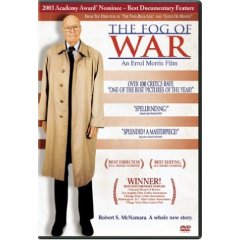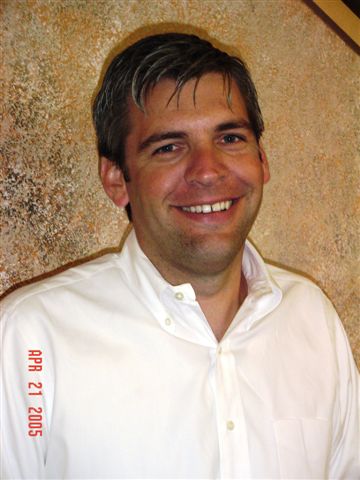
“Every Military commander who is honest to himself will admit that he has made mistakes with the application of military power that has resulted in needless deaths.”
-Robert S. McNamara
You have to hope that your leaders are the type of people who at times take time to step back and reflect on their policies and their actions. A great Saturday afternoon “time out” activity for George W. Bush and Don Rumsfeld would be to sit down and watch the documentary, “The Fog of War: Eleven Lessons from the life of Robert S. McNamara.”
For seven years in the 1960s Robert Strange McNamara served as the United States Secretary of Defense. Weeks after starting as the first outside-the-family President of Ford Motor company, President Kennedy appointed McNamara as Secretary of Defense, despite McNamara’s uncertainty whether he was qualified for the job. Serving first under Kennedy, and then under Lyndon Johnson, McNamara held the office during a time that, as McNamara puts it, “on three different occasions we came within a hairs breath of nuclear war with the U.S.S.R.”
This film is interesting in that McNamara, eighty-five at the time of the filming, reflects and shares with us what he’s learned from his experience as a war fighter. McNamara lists eleven “lessons” he’s taken away these experiences, and the film fills out the background that has lead him to these insights.
The film leads us from McNamara’s WWII experience, to the Cuban missile crisis, and to the events that led to the United States’ entry and eventual escalation of the Vietnam war. What comes out is sobering parade of human miscalculations and brutality. In WWII, McNamara served in the Air Force’s statistical air corps. From there he analyzed the efficiency of delivered force against Japanese targets, specifically the fire bombing of Japan. He sites the example of 100,000 Japanese civilians killed in a single night as a result of fire bombing and questions the morality of this decision (That was just one night, the segment on 67 Japanese cities and the percentages of them that burned is scary). Is that okay in war? Was it the right thing to do in order to fight the war? McNamara points out that if the United States had lost, General Curtis Lemay who made the firebombing decision and himself would certainly have been tried as war criminals by the Japanese. In the film McNamara ponders, what makes it moral if we win, but immoral if we’d lost.
Near the start of the film McNamara takes us through the Cuban missile crisis and his revelations in the 1990s when he actually met with Castro to discuss the crisis. He asked Castro – did you know the missiles were there? If so, would you have told Kruschev to use them, and if you would, what do you think would have happened? I won’t spoil it, but it we came closer to nuclear war than we even knew. McNamara’s point is that Kennedy, Kruschev, and Castro were all very rational men, but still we came so close to madness.
The film is fascinating. It has many interesting side anecdotes about JFK and LBJ. McNamara was actually the person who walked the ground of Arlington Cemetery, found the most beautiful spot, and proposed it to Jackie Kennedy as the spot to bury JFK.
The piece I think would be most interesting for George W. and Don Rumsfeld to ponder was near the end. McNamara believes that as the lone super power the United States should never apply its force unilaterally, “if we can’t persuade nations with common values of our case, we should re-examine our reasoning.” McNamara was talking about Vietnam, but clearly this question has meaning today (incidentally, the U.S. is not applying force in Iraq unilaterally, but certainly it could (and is) be debated if the degree to which it has multi-lateral support satisfies McNamara’s suggestion.
Where McNamara clearly had the most impact and of course what he is most known for is the U.S. escalation and execution of the Vietnam war. It is his belief that had JFK lived we would have gotten out far sooner, and that Johnson held the responsibility for the escalation – though he paints LBJ in a sympathetic light. The film, and actual recordings illustrate the clear hesitation, and conflict these two men had around escalation the war to include significant ground troops.
In the end we have some very interesting lessons, but even McNamara leaves us without an “answer.” He is not so naïve to think we’ll just end all war. His sum up of the film is where it gets its name. He describes the term “Fog of war” and what it means to him. Essentially that a war is so complex that it is beyond the capability of any person to understand all of the variants, and the result as that we as humans needlessly kill people. “It isn’t that we aren’t rational, we are, but reason has limits.”



No comments:
Post a Comment